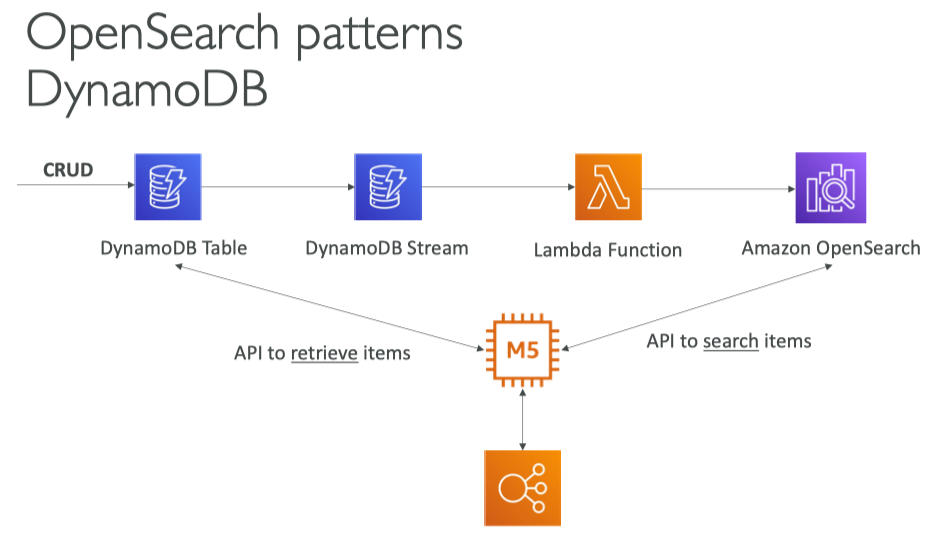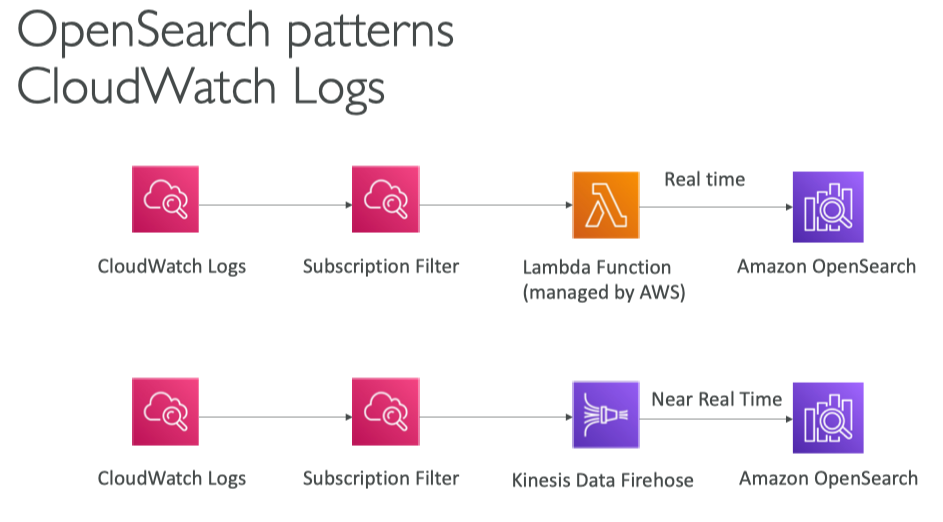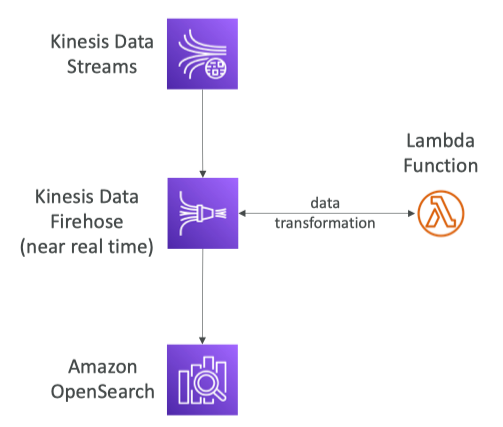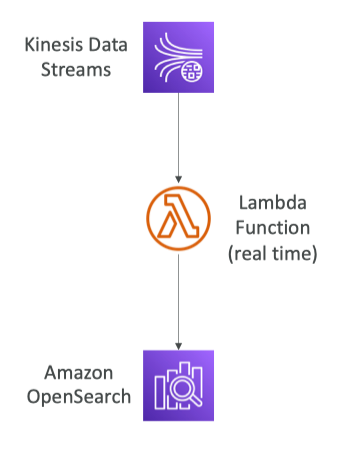- Successor to ElasticSearch
- With OpenSearch, you can search any field, even partial matches
- whereas in DynamoDB, queries only exist by primary key or indexes
- It is common to use OpenSearch as a complement to another database
- Two modes
- managed cluster
- instances are provisioned and will be visible
- serverless cluster
- everything from scaling to operations are managed by AWS
- managed cluster
- Does not natively support SQL
- but can be enabled via a plugin
- Ingestion from
- Kinesis Firehose
- AWS IoT
- CloudWatch logs
- or any of your custom built app
- Security
- Comes with OpenSearch Dashboards (visualization)
Opensearch Patterns
ChatGPT Overview
AWS OpenSearch Service is a managed service provided by Amazon Web Services (AWS) that allows you to deploy, operate, and scale open-source search and analytics engines such as Elasticsearch and Kibana in the AWS Cloud. It simplifies the setup and management of Elasticsearch clusters, making it easier for developers and organizations to build powerful search and analytics applications.
Key Features of AWS OpenSearch Service
-
Managed Elasticsearch: AWS OpenSearch Service offers a fully managed Elasticsearch service, eliminating the need for manual cluster management tasks such as hardware provisioning, software installation, patching, and backups. AWS handles infrastructure maintenance and scaling automatically.
-
High Availability and Fault Tolerance: OpenSearch Service automatically deploys Elasticsearch clusters across multiple Availability Zones (AZs) within a region to ensure high availability and fault tolerance. It replicates data and indices across nodes to prevent data loss and minimize downtime.
-
Scalability and Performance: OpenSearch Service allows you to scale Elasticsearch clusters up or down dynamically to accommodate changes in workload demand. You can add or remove nodes, adjust instance types, and configure auto-scaling policies based on metrics such as CPU usage and storage capacity.
-
Integration with AWS Services: OpenSearch Service integrates seamlessly with other AWS services such as Amazon S3, Amazon CloudWatch, AWS Identity and Access Management (IAM), and AWS Key Management Service (KMS). This enables you to ingest data from various sources, monitor cluster performance, manage access controls, and encrypt data at rest and in transit.
-
Security and Compliance: OpenSearch Service provides built-in security features to protect your data and resources. It supports encryption of data at rest using AWS KMS, encryption of data in transit using Transport Layer Security (TLS), fine-grained access controls using IAM policies and access roles, and integration with VPC for network isolation.
-
Search and Analytics: OpenSearch Service allows you to perform advanced search and analytics on large volumes of data in real time. You can use Elasticsearch’s powerful query language and aggregation capabilities to search, filter, and analyze structured and unstructured data across multiple indices and fields.
-
Kibana Integration: OpenSearch Service includes integration with Kibana, an open-source analytics and visualization platform for Elasticsearch. Kibana provides a user-friendly interface for exploring, visualizing, and analyzing data stored in Elasticsearch clusters, allowing you to create dashboards, charts, and reports.
-
Managed Upgrades: OpenSearch Service manages Elasticsearch version upgrades and patches automatically, ensuring that your clusters are always running the latest stable releases with the latest security fixes and performance improvements. You can schedule maintenance windows for upgrades to minimize disruption to your applications.
Use Cases for AWS OpenSearch Service
-
Log and Event Analysis: You can use OpenSearch Service to ingest, index, and analyze log and event data from various sources such as applications, servers, and network devices. This enables you to monitor system performance, detect anomalies, and troubleshoot issues in real time.
-
Full-Text Search: OpenSearch Service is well-suited for implementing full-text search functionality in applications such as e-commerce websites, content management systems, and document repositories. You can index and search large volumes of textual data with high accuracy and speed.
-
Business Intelligence (BI): OpenSearch Service can be used for business intelligence and data analytics applications, allowing you to perform ad-hoc queries, generate reports, and create visualizations on structured and semi-structured data sets.
-
Application Monitoring: You can use OpenSearch Service to monitor application performance, track user interactions, and analyze user behavior patterns. This enables you to gain insights into application usage, identify trends, and optimize user experiences.
-
Security Information and Event Management (SIEM): OpenSearch Service can serve as the backend for SIEM solutions, allowing you to ingest and analyze security event data from firewalls, intrusion detection systems (IDS), and other security appliances. This helps you detect and respond to security threats in real time.
-
Machine Learning and Data Mining: OpenSearch Service can be integrated with machine learning (ML) frameworks such as Amazon SageMaker and Apache Spark for advanced analytics and predictive modeling tasks. You can use Elasticsearch’s search and aggregation capabilities to preprocess and analyze data before feeding it into ML algorithms.
AWS OpenSearch Service is a versatile and scalable solution for building search and analytics applications in the cloud. Whether you need to implement full-text search, log analysis, business intelligence, or real-time monitoring, OpenSearch Service provides the tools and infrastructure you need to ingest, index, and analyze large volumes of data efficiently and cost-effectively.



